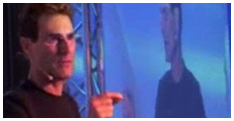Investigating the paranormal
WE publish this week a paper by Drs R. Targ and H. Puthoff (page 602) which is bound to create something of a stir in the scientific community. The claim is made that information can be transferred by some channel whose characteristics appear to fall “outside the range of known perceptual modalities”. Or, more bluntly, some people can read thoughts or see things remotely.
Such a claim is, of course, bound to be greeted with a preconditioned reaction amongst many scientists. To some it simply confirms what they have always known or believed. To others it is beyond the laws of science and therefore necessarily unacceptable. But to a few – though perhaps to more than is realised – the questions are still unanswered, and any evidence of high quality is worth a critical examination.
The issue, then, is whether the evidence is of sufficient quality to be taken seriously. In trying to answer this, we have been fortunate in having the help of three independent referees who have done their utmost to see the paper as a potentially important scientific communication and not as a challenge to or confirmation of prejudices. We thank them for the considerable effort they have put in to helping us, and we also thank Dr Christopher Evans of the National Physical Laboratory whose continued advice on the subject is reflected in the content of this leading article.
A general indication of the referees’ comments may he helpful to readers in reaching their own assessment of the paper. Of the three, one believed we should not publish one did not feel strongly either way and the third was guardedly in favour of publication. We first summarise the arguments against the paper.
(1) There was agreement that the paper was weak in design and presentation, to the extent that details given as to the precise way in which the experiment was carried out were disconcertingly vague. The referees felt that insufficient account had been taken of the established methodology of experimental psychology and that in the form originally submitted the paper would be unlikely to be accepted for publication in a psychological journal on these grounds alone. Two referees also felt that the authors had not taken into account the lessons learnt in the past by parapsychologists researching this tricky and complicated area.
(2) The three referees were particularly critical of the method of target selection used, pointing out that the choice of a target by “opening a dictionary at random” is a naive, vague and unnecessarily controversial approach to randomisation. Parapsychologists have long rejected such methods of target selection and, as one referee put it weaknesses of this kind reveal “a lack of skill in their experiments, which might have caused them to make some other mistake which is less evident from their writing”.
(3) All the referees felt that the details given of various safeguards and precautions introduced against the possibility of conscious or unconscious fraud on the part of one or other of the subjects were “uncomfortably vague” (to use one phrase). This in itself might be sufficient to raise doubt that the experiments have demonstrated the existence of a new channel of communication which does not involve the use of the senses.
(4) Two of the referees felt that it was a pity that the paper, instead of concentrating in detail and with meticulous care on one particular approach. to extra-sensory phenomena, produced a mixture of different experiments, using different subjects in unconnected circumstances and with only a tenuous overall theme. At the best these were more “a series of pilot studies . . . than a report of a completed experiment”.
On their own these highly critical comments could be grounds for rejection of the paper, but it was felt that other points needed to be taken into account before a final decision could be made.
(1) Despite its shortcomings, the paper is presented as a scientific document by two qualified scientists, writing from a major research establishment apparently with the unqualified backing of the research institute itself:
(2) The authors have clearly attempted to investigate under laboratory conditions phenomena which, while highly implausible to many scientists, would nevertheless seem to be worthy of investigation even if, in the final analysis, negative findings are revealed. If scientists dispute and debate the reality of extra-sensory perception, then the subject is clearly a matter for scientific study and reportage.
(3) Very considerable advance publicity-it is fair to say not generated by the authors or their institute-has preceded the presentation of this report. As a result many scientists and very large numbers of non-scientists believe, as the result of anecdote and hearsay, that the Stanford Research Institute (SRI) was engaged in a major research programme into parapsychological matters and had even been the scene of a remarkable breakthrough in this field. The publication of this paper, with its muted claims, suggestions of a limited research programme, and modest data, is, we believe, likely to out the whole matter in more reasonable perspective.
(4) The claims that have been made by, or on behalf of, one of the subjects, Mr Uri Geller, have been hailed publicly as indicating total acceptance by the SRI of allegedly sensational powers and may also perhaps now be seen in true perspective. It must he a matter of interest to scientists to note that, contrary to very widespread rumour, the paper does not present any evidence whatsoever for Geller’s alleged abilities to bend metal rods by stroking them, influence magnets at a distance, make watches stop or start by some psychokinetic force and so on. The publication of the paper would be justified on the grounds of allowing scientists the opportunity to discriminate between the cautious, limited and still highly debatable experimental data, and extravagant rumour, fed in recent days by inaccurate attempts in some newspapers at precognition of the contents of the paper.
(5) Two of the referees also felt that the paper should be published because it would allow parapsychologists, and all other scientists interested in researching this arguable field, to gauge the quality of the Stanford research and assess how much it is contributing to parapsychology.
(6) Nature, although seen by some as one of the world’s most respected journals cannot afford to live on respectability. We believe that our readers expect us to be a home for the occasional ‘high-risk’ type of paper. This is hardly to assert that we regularly fly in the face of referees’ recommendations (we always consider the possibility of publishing as in this case, a summary of their objections). It is to say that the unusual must now and then be allowed a toe-hold in the literature, sometimes to flourish, more often to be forgotten within a year or two.
The critical comments above were sent to the authors who have modified their manuscript in response to them. We have also corresponded informally with the authors on one or two issues such as whether the targets could have been forced by standard magical tricks, and are convinced that this is not the case. As a result of these exchanges and the above considerations we have decided to publish in the belief that, however flawed the experimental procedure and however difficult the process of distilling the essence of a complex series of events into a scientific manuscript, it was on balance preferable to publish and maybe stimulate and advance the controversy rather than keep it out of circulation for a further period.
Publishing in a scientific journal is not a process of receiving a seal of approval from the establishment; rather it is the serving of notice on the community that there is something worthy of their attention and scrutiny. And this scrutiny is bound to take the form of a desire amongst some to repeat the experiments with even more caution. To this end the New Scientist does a service by publishing this week the results of Dr Joe Hanlon’s own investigations into a wide range of phenomena surrounding Mr Geller. If the subject is to be investigated further – and no scientist is likely to accept more than that the SRI experiments provide a prima facie case for more investigations – the experimental technique will have to take account of Dr Hanlon’s strictures, those of our own referees and those doubtless, of others who will be looking for alternative explanations.
Perhaps the most important issue raised by the circumstances surrounding the publication of this paper is whether science has yet developed the competence to confront claims of the paranormal. Supposedly paranormal events frequently cannot be investigated in the calm, controlled and meticulous way that scientists are expected to work, and so there is always a danger that the investigator, swept up in the confusion that surrounds many experiments, abandons his initial intentions in order to go along with his subject’s desires. It may be that all experiments of this sort should be exactly prescribed beforehand by one group, done by another unassociated group and evaluated in terms of performance by the first group. Only by increasing austerity of approach by scientists will there be any major progress in this field.


Latest Articles

Motivational Inspirational Speaker
Motivational, inspirational, empowering compelling 'infotainment' which leaves the audience amazed, mesmerized, motivated, enthusiastic, revitalised and with a much improved positive mental attitude, state of mind & self-belief.


















